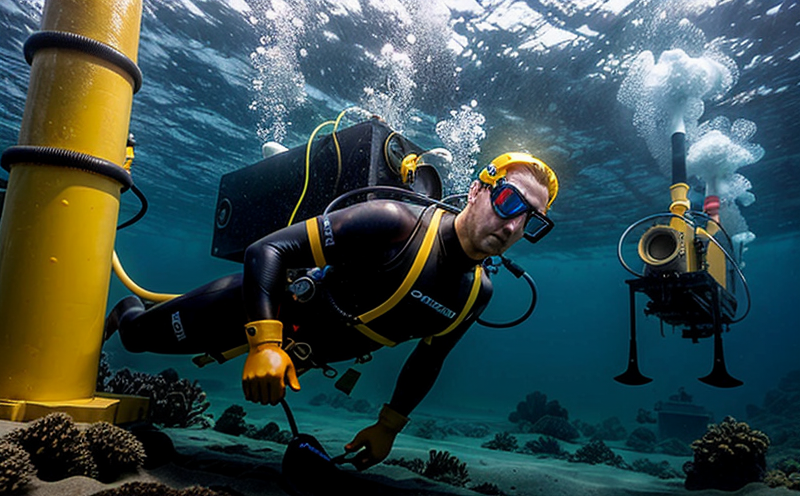ASTM B117 Salt Spray Corrosion Testing of Underwater Equipment
The ASTM B117 salt spray corrosion testing method is a standardized procedure widely used to evaluate the resistance of materials, coatings, and surfaces to corrosive environments. This test simulates the corrosive effects of marine atmospheres or seawater on underwater equipment by subjecting specimens to a continuous mist of sodium chloride solution.
For subsea and underwater equipment, this method is critical for ensuring long-term durability and reliability in harsh marine conditions. The ASTM B117 standard specifies the apparatus, procedure, and acceptance criteria necessary to conduct salt spray testing effectively. This ensures that all participants follow a consistent protocol, allowing for accurate comparisons of test results.
The process involves placing specimens within a closed chamber where they are exposed to a steady stream of fine mist containing 5% sodium chloride (NaCl) solution at a temperature between 35°C and 37°C. The duration of exposure can vary depending on the specific requirements set by the client or regulatory body, but it typically ranges from 168 hours to several weeks.
Preparation of specimens is crucial for accurate testing results. Specimens must be clean, free from any contaminants that could affect their performance during testing. They should also be representative of the actual product being evaluated, ensuring that test results are indicative of real-world conditions. Any surface preparation steps required will depend on the nature of the material and its coating.
Upon completion of the exposure period, specimens are visually inspected for signs of corrosion such as rust formation, pitting, or general discoloration. Acceptance criteria specify the maximum allowable amount of visible corrosion permitted before a specimen fails the test.
The results from ASTM B117 salt spray testing provide critical insights into how well materials and coatings perform under simulated marine conditions. This information is invaluable for R&D teams working on improving product durability, compliance officers ensuring adherence to industry standards, and procurement departments selecting suppliers who meet stringent quality requirements.
By incorporating ASTM B117 salt spray testing early in the design process, manufacturers can identify potential issues with material selection or coating application before products reach production stages. This proactive approach helps reduce costs associated with rework or recalls later on.
- Customer Impact and Satisfaction:
Conducting ASTM B117 salt spray testing not only meets regulatory requirements but also enhances customer confidence by demonstrating a commitment to quality. Satisfied customers are more likely to recommend your products or services, leading to increased market share.
- Improved Product Durability:
- Better Compliance with Industry Standards:
- Informed Decision-Making for R&D Teams:
Through rigorous testing, companies can make informed decisions about material choices and coating applications, ultimately resulting in more robust products.
Quality and Reliability Assurance
Ensuring the quality and reliability of underwater equipment is paramount given its critical role in maritime operations. By adhering to ASTM B117 salt spray testing protocols, manufacturers can demonstrate their commitment to producing high-quality products that meet or exceed industry standards.
This testing method plays a vital role in identifying potential weaknesses in materials and coatings used in subsea applications. It allows engineers to pinpoint areas requiring improvement early on in the product development cycle, thereby minimizing costly mistakes during later stages of production.
Compliance with ASTM B117 ensures that all involved parties follow consistent procedures, resulting in reliable data across different locations and facilities. This consistency is essential for maintaining trust among stakeholders who rely on these tests to make informed decisions regarding their investments in maritime infrastructure or equipment.
The rigorous nature of ASTM B117 salt spray testing helps maintain high standards within the industry by providing a uniform benchmark against which all participants can be assessed fairly and objectively. This fosters competition based on merit rather than arbitrary factors, promoting innovation while ensuring safety standards are met.
Competitive Advantage and Market Impact
Implementing ASTM B117 salt spray testing provides significant advantages for businesses operating within the marine & ship equipment sector. It allows them to stay ahead of competitors by consistently delivering superior products that perform reliably even in challenging environments.
Through rigorous testing, companies can identify and address potential issues early on, ensuring that only robust materials and coatings are used in final products. This enhances overall product quality, which is particularly important when dealing with equipment meant for harsh marine conditions.
In addition to enhancing internal processes, ASTM B117 also contributes positively towards the company's public image by showcasing its dedication to excellence and adherence to best practices within the industry. Such initiatives can significantly boost brand reputation among both consumers and potential partners.
Moreover, compliance with such standards demonstrates a commitment to sustainability goals, as it helps extend the lifespan of products, reducing waste generation and environmental impact over time.





